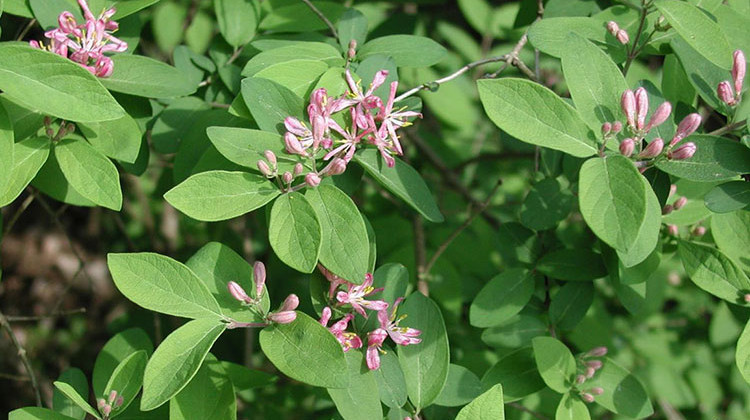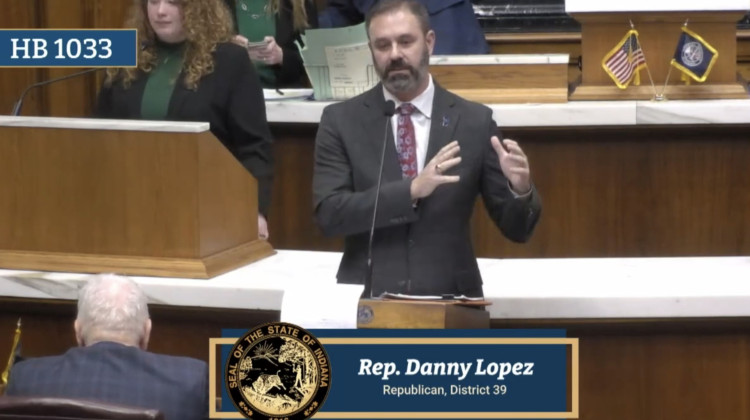
Bell's honeysuckle is one of 44 invasive plant species that will be illegal to sell in Indiana.
Leslie J. Mehrhoff/University of Connecticut, Bugwood.orgINDIANAPOLIS (AP) — Nearly four dozen invasive plants that pose a threat to Indiana’s native plants and animals are now illegal to sell, exchange, transport and give as gifts under a new statewide rule that primarily targets plants sold in the nursery trade.
The rule banning 44 species of invasive plants, including five different species of honeysuckles that eventually choke out surrounding plants, took effect April 18, The Indianapolis Star reported.
Under the Terrestrial Plant Rule, the plants are prohibited from being sold, gifted, exchanged or even transported within the state, punishable by a $500 fine per incident per day. The plants can still be owned.
“The Terrestrial Plant Rule is the first rule that actually looks out for the health and well being of terrestrial ecosystems,” said Ethan Olson, director of native landscape at Keep Indianapolis Beautiful. “This rule is a pretty big win for folks who care about the environment, and it's hopefully a jumping off point.”
Species in the ban also include the Japanese barberry and Wintercreeper.
The Callery pear tree, however, was left off the banned list even though they often break and cause severe damage during a storm; the state decided the economic impact of banning Callery pears would be too large on growers.
Olson said it was not economically responsible to wait to address the issue of Callery pears, but Cliff Sadof, an entomology professor at Purdue University, says the overall Terrestrial Plant Rule is a good start toward addressing a long-standing issue.
“I would like to commend the state for their efforts on passing this legislation,” Sadof said. “It's much needed. It is a great first step."
The prohibited invasive plants:
- Achyranthes japonica (Japanese chaff flower)
- Ailanthus altissima (tree of heaven)
- Alliaria petiolata (garlic mustard)
- Alnus glutinosa (black alder)
- Artemisia vulgaris (mugwort)
- Arthraxon hispidus (small carpgrass)
- Berberis thunbergii (Japanese barberry)
- Carduus acanthoides (spiny plumeless thistle)
- Carduus nutans (musk thistle)
- Celastrus orbiculatus (Asian bittersweet)
- Centaurea stoebe (spotted knapweed)
- Cirsium vulgare (bull thistle)
- Conium maculatum (poison hemlock)
- Convolvulus arvensis (field bindweed)
- Coronilla varia (crown vetch)
- Dioscorea polystachya (oppositifolia) (Chinese yam)
- Dipsacus fullonum (common teasel)
- Dipsacus laciniatus (cut-leaved teasel)
- Elaeagnus umbellata (autumn olive)
- Euonymus fortunei (wintercreeper)
- Euphorbia esula (leafy spurge)
- Frangula alnus (glossy buckthorn)
- Hesperis matronalis (dame’s rocket)
- Humulus japonicus (Japanese hops)
- Lepidium latifolium (pepperweed)
- Lespedeza cuneata (sericea lespedeza)
- Ligustrum obtusifolium (blunt leaved privet)
- Lonicera japonica (Japanese honeysuckle)
- Lonicera maacki (Amur honeysuckle)
- Lonicera morrowii (Morrow’s honeysuckle)
- Lonicera tatarica (Tatarian honeysuckle)
- Lonicera x bella (Bell’s honeysuckle)
- Microstegium vimineum (Japanese stiltgrass)
- Morus alba (white mulberry)
- Phalaris arundinacea (reed canarygrass)
- Phellodendron amurense (Amur cork tree)
- Phragmites australis subspecies australis (common reed)
- Polygonum perfoliatum (mile-a-minute vine)
- Reynoutria japonica (Japanese knotweed)
- Reynoutria sachalinensis (giant knotweed)
- Reynoutria x bohemica (Bohemian knotweed)
- Rhamnus cathartica (common buckthorn)
- Vincetoxicum nigrum (black swallow-wort)
- Vincetoxicum rossicum (pale swallow-wort)
 DONATE
DONATE








 Support WFYI. We can't do it without you.
Support WFYI. We can't do it without you.